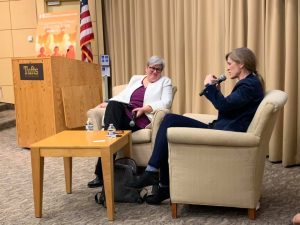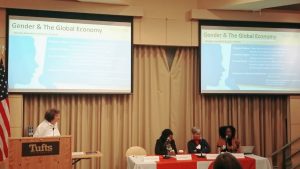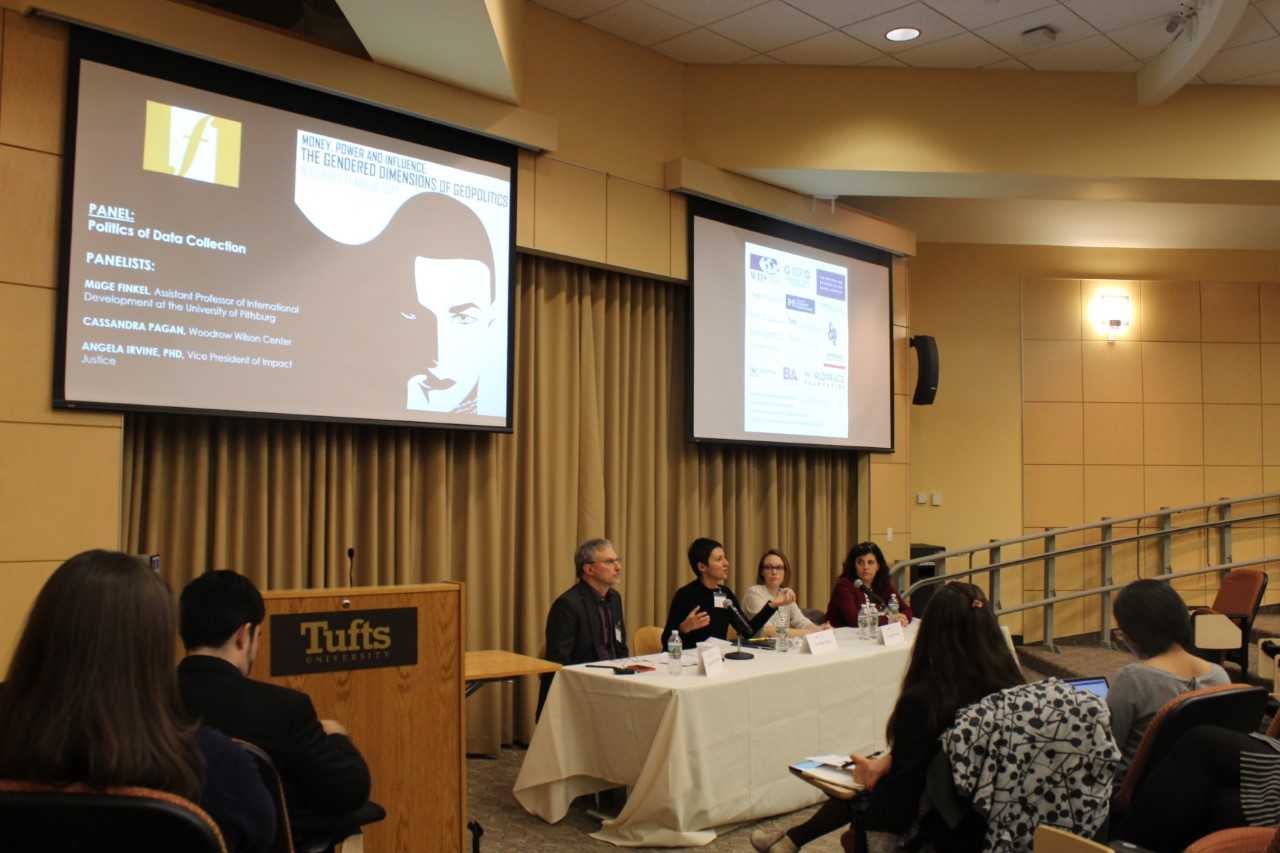Visit the CGIA Website for more information on this year’s Conference.
2023
Power, Policy, Progress : Redefining Authority, Reshaping Influence
Fletcher’s 9th Annual Conference on Gender and International Affairs (CGIA) strives to create a platform for academics, practitioners, and community leaders to come together to discuss how gender affects and is affected by today’s global issues. In its ninth year, the Conference continued the tradition of student and faculty advocacy at Fletcher to integrate gender analyses into our work. The conference was attended by people across the world, with speakers flying in from multiple cities, states, and countries. It was entirely student-run.
Mission Statement
As Fletcher’s longest-running student-led conference, CGIA 2023 is dedicated to the principles of inclusivity, accountability, liberation, and growth through sparking conversations across disciplines and de- and re- constructing conceptions of power in international affairs.

Closing Plenary Speaker and Former Mayor of San Juan, Puerto Rico, Yulin Cruz
2022
Challenging for Change: Amplifying Voices into Action
Making a change, no matter the context, is never easy. Structures that exist around us are usually not just or equitable, and they tend to serve the interests of those who maintain them. As a result, any change that is attempted must collide with the power asymmetries that maintain the status quo.
The 2022 conference explored various wonderful acts of resistance across the world, and across contexts, celebrated those who are part of these resistances, and, most importantly, emphasized the importance of joy and care, both as tools at the disposal of these crusaders but also as acts of resistance themselves.
The conference focused on intentionality in curating panels, speakers, and workshops, finding caterers, and engaging with our communities both at Fletcher and beyond. Every aspect of our conference reflected the theme, and we hope it will be a start to a much larger conversation.
2020 & 2021
The Sixth Annual Fletcher Conference on Gender and International Affairs: Transforming Bodies of Power: Organize, Amplify Lead
The Fletcher School of Law and Diplomacy at Tufts University hosted the Sixth Annual Conference on Gender and International Affairs throughout the Fall 2020 and Spring 2021 semesters. Due to the COVID-19 pandemic, the Conference was divided into a speaker series, where each month had a different panel of speakers to discuss topics related to transforming bodies of power. The theme built upon the previous five conferences and questioned the nature of global and local power structures and their influence on our lives. The conference aimed to respond to the present need to be cognizant of, and ultimately reconceptualize, bodies of power, encouraging participants to utilize gender as an analytical tool for expanding our collective consciousness, while also analyzing the effects of the pandemic on progress in gender issues.
The Conference featured the following panels:
- Reimagining Power & Leadership
- Feminist Foreign Policy
- Bodies of Resistance
- The Politics of Appearance
- Narrative Justice
- Feminist Economics
- Reproductive Justice: International Fault Lines
- The Athlete’s Body: Power, Resistance, and Control
2019
The Fifth Annual Fletcher Conference on Gender and International Affairs: [En]gendering Change: A Rally for Action
The Fletcher School of Law and Diplomacy at Tufts University hosted the Fifth Annual Conference on Gender and International Affairs on November 15 and 16, 2019, featuring keynote speaker, Samantha Power. The goal of this theme was to expand upon the previous four conferences by focusing on how gender can be used pragmatically within the field of international affairs. The Conference wanted to create an environment where students and the general public alike would have the opportunity to draw from the dialogues throughout the events in order to take action and foster progressive change themselves.
The Conference featured the following panels:
- Anatomy of an Ally
- Bodies as Battle Grounds
- Breaking Down the Binary
- Decoding the Patriarchy
- Empowering Future Leaders
- Gendering Research Design
- Marginalized Masculinities
- Women in Conflict
2018
The Fourth Annual Fletcher Conference on Gender and International Affairs: Gender, Justice & Politics: Movement from the Margins
The Fletcher School of Law and Diplomacy at Tufts University hosted the Fourth Annual Conference on Gender and International Affairs on November 16 and 17, 2018. Over the past three years, the conference has brought hundreds of individuals across the Fletcher, Tufts, and greater Boston communities together to cultivate their knowledge of gender analysis and the application of a gendered lens to the fields of international affairs, development, business, and public policy. Panel topics in the past have included feminist foreign policy, queering international relations, and the politics of data collection, among many others.
This year’s theme, Gender, Justice & Politics: Movement from the Margins, expands upon the previous three conferences by broadening the application of a gendered lens from the individual to states and institutions and by exploring the role of gender in global issues. The goal of this year’s Conference on Gender and International Affairs is to facilitate conversations about gender and power, with a particular focus on the ways in which communities are marginalized and how they challenge the status quo. The Conference aims to deepen participants’ understanding of the hierarchical nature of constituent groups’ access to opportunities and influence in global politics. Through open conversation, the Conference also endeavors to emphasize the necessity of an intersectional lens in understanding the gendered dimensions of justice and politics.
This year’s Conference is particularly focused on introducing a gender lens to professional fields and sectors from which it has been traditionally absent or ignored. The Conference featured the following five panels:
- Voices of Power
- Gender and the Global Economy
- Climate Change and Environmental Justice
- Masculinities and Weaponized Violence
- Gendered Deficiencies of International Law
The panels were be supplemented with an in-depth conversation on gender in the midterm elections, and workshops on op-ed writing and gender-sensitive research. Ultimately, we the conference aimed for participants to leave the conference with a greater, more nuanced understanding of intersectional gender analysis and as advocates for gender sensitivity within their fields of work.
2017
The Third Annual Fletcher Conference on Gender and International Affairs: Money, Power, and Influence: The Gendered Dimensions of Geopolitics
The Fletcher School of Law and Diplomacy at Tufts University hosted its third annual Conference on Gender and International Affairs on November 17 and 18, 2017. The theme was Money, Power, and Influence: The Gendered Dimensions of Geopolitics. It expanded on the foundation laid by the previous two conferences, which explored gender analysis and gender-sensitive leadership. The panel topics in the past included feminist foreign policy, urban displacement, and decision-making in security.
The goal of the Conference is to facilitate conversations surrounding gender and power, their impact at the individual, community, institutional, state, and multilateral levels, and what this means for policy and programming in practice. Through these conversations, the conference aims to deepen participants’ understandings of the relevance of gender in relation to status, access, and influence in all areas of international relations. The Conference seeks to reiterate the importance of applying an intersectional lens towards issues in international affairs since gender and power intersect and are enmeshed within other aspects of identity, such as class, citizenship, and sexuality.

The 2017 conference was particularly focused on introducing a gender lens to professional fields and sectors in which it has been traditionally absent or ignored. The Conference featured the following five panels:
- Gender in Nuclear Security
- Queering International Relations
- The Politics of Data Collection
- Gender, Guns, and Gangs
- Gender and Impact Investing
The panels were supplemented with specialized breakout sessions including education in armed conflict and gender and food security. Ultimately, the goal was for audience members to leave the Conference with a broader, more nuanced understanding of intersectional gender analysis and as advocates for gender-sensitivity within their fields of work.
2016
The Second Annual Fletcher Conference on Gender and International Affairs: Gender-Sensitive Leadership: Putting Theory into Practice
For more information please visit the gender conference website.
The Second Annual Conference on Gender and International Affairs will be held at The Fletcher School of Law and Diplomacy on December 2 and 3, 2016. The Conference continues a tradition of student and faculty advocacy at The Fletcher School that challenges the institution to integrate gender analyses into all aspects of the institution and its work. This year’s theme, Gender-Sensitive Leadership: Putting Theory into Practice, builds on the ongoing feminist examination of power structures and gendered institutions to identify the contexts and strategies that support gender-sensitive leadership in the diplomatic, business, and security sectors.

The 2015 conference attracted over 250 students, faculty and practitioners, from the Fletcher community and the Greater Boston area, who represented over 40 institutions. Insights gleaned from traditional and new media coverage show that the Conference’s influence reached audiences across the region and became a resource for gender thought leadership. We hope to continue this success and welcome all students, faculty, and practitioners interested in understanding how power and gender influence issues in international affairs and acquiring strategies to promote gender-sensitivity in their work.
Gender-sensitive leadership is the application of feminist theory and power analysis to the daily decision-making processes that uphold or challenge gendered institutions. Its scope extends beyond women’s empowerment and includes the pursuit of equity and inclusion for all populations these institutions aim to serve. Paying greater attention to gendered experiences requires leaders to consider who has access to power and why some voices may be valued over others. The Conference seeks to identify the tangible qualities that define gender-sensitive leadership and provide strategies for leaders to respond to gendered varied needs. Conference attendees will also be empowered to embody and advocate for gender-sensitive leadership within their own institution.
Sessions at the conference will explore opportunities and challenges in gender-sensitive leadership in the following areas:
- Security Decision-Making: Access and Impact
- Feminist Foreign Policy & Diplomacy
- Entrepreneurial Viability: The Case for Inclusive Economies
Each session will:
- Analyze how leaders’ decisions impact people of all genders and sexual orientations differently, taking into account intersectional social and political identities
- Highlight the impact of gender-sensitive leadership by examining current and best practices in each sector
- Discuss gaps and challenges in research, programming efforts, law, and policy relevant to the sector
- Provide pragmatic suggestions for leading with gender-sensitivity and furthering existing gender-mainstreaming efforts in each sector
2015
The inaugural Fletcher Conference on Gender and International Affairs: Gender and International Affairs: Avenues for Change
In December 2015, The Fletcher School hosted its first annual conference on gender issues, titled “Gender and International Affairs: Avenues for Change.” The conference was student-run, organized by The Gender Initiative and Global Women, and it enjoyed wide support from the faculty and administration. Fletcher Dean James Stavridis noted in the program: “Nothing is more important to the overall potential of the world than our ability to fully develop and use the potential of everyone, women and men alike and equally. The study of gender affords us the best chance of doing so, and deserves our strongest level of engagement. The Fletcher School of Law and Diplomacy is committed to doing so with energy and enthusiasm, and this conference is a good example of our approach.”
The conference drew together over 300 participants from schools across the Boston area and hailing from countries around the world. Social media activity surrounding the conference hashtag, #FletcherGender2015, resulted in the hashtag trending in the Boston area. The conference also received recognition in Foreign Policy Interrupted, a listserv of gender in foreign policy. For key insights, please see below.
The conference was possible thanks to institutional support from The Office of the Executive Associate Dean and Office of Student Affairs. The organizing committee is grateful to the institutional sponsors: the Institute for Human Security, the Fares Center for Eastern Mediterranean Studies, the Hitachi Center for Technology and International Affairs, the Institute for Global Leadership, and the International Security Studies Program.
The organizers are further grateful to student organizations who lent their support: The Diplomacy Club, Fletcher LGBTQA, the Global health Group, the Human Rights Project, the Humanitarian Action Society, the International Migration Group, Praxis, the Fletcher Journal of Human Security, the Ralphe Bunche Society for Diversity in International Relations, and Tech@Fletcher.


